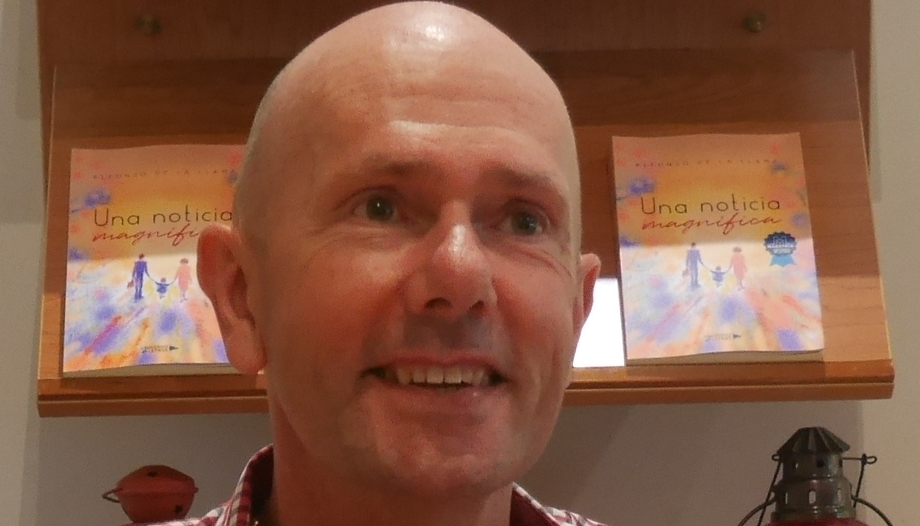




















Alfonso de la Llama is a biologist with two professions. On the one hand, he has taught biology and religion to teenagers for years. He is also an environmentalist dedicated to the eradication of pests and invasive species. He has never devoted himself to writing, but at the age of 60, he felt the need to bring the figure of Jesus Christ closer to those who do not know him. The surprise has been that Planeta has published his book on the Gospel of St. Matthew under one of its imprints, Universo de letras.
What do you think is so important about the book that such an important publishing house has decided to publish it? From what perspective did you write it?
The Gospel has illuminated the thought, art and customs of the West, bringing equality and freedom to society over the centuries. The publishing house knows this. To think that it is not fashionable is like saying that wisdom is no longer of interest to anyone.
You say in the book that for a long time you read Sacred Scripture superficially. What made you realize that this was the case? Does this awakening of yours have something to do with what you are trying to transmit to your readers?
We run the risk of reading the Gospel as if it were a story we already know. Gradually, you realize that this is not the case. St. Josemaría teaches the importance of being part of the various scenes. Each one can live them and meditate on them again and again, in his own way, the way God shows him.
How do you think the biblical formation of Spanish believers is? I am referring to the practicing ones.
Very educated people have serenely delved into the bible, they know it in depth. Others, the great majority of us, can be defined as people who study a language to get by, without any intention of learning it; we read the leaflets when the problems start, once we feel bad.
What do you recommend for further training in biblical topics?
The inclination to form oneself well is a sign of wisdom. The Old Testament is full of wonderful stories, the parables of Jesus, narrated from a deep knowledge of human nature. No one, like Him, knows what we men need at every moment, He wants to be intimate with us, that we ask Him. Wise men and saints throughout the centuries have contemplated the readings of the Mass in an admirable way. Meditating on them every day can be a good start. It is seldom perceived as something exciting, enriching, a real pity.
Could you give a concrete example to understand why he is interested in further training?
Here is an example. Let us think of the scene of the hemorrhagic woman. Jewish society was very demanding in some points: it excluded lepers, discriminated against sinners, isolated those it considered impure. Many Pharisees pretended to be perfect, hiding their sins. Like the famous one who, when interviewed, affirms that his greatest defect is to be too generous.
The hemorrhoea's situation cannot be hidden. She suffers from a disease that embarrasses her and isolates her from others, probably originating from complications during childbirth. There are no pads or diapers. Every time she gets up from her seat, her flow of blood is evident to everyone, without her being able to conceal it. When she caresses her small child, it is contaminated. The children are cruel and mocking, they do not want to play with him. The Pharisees remind her husband again and again that they cannot have relations. Poor woman, she has not been allowed to enter the synagogue for twelve years. She is almost a stinker.
Confused in the tumult, she pushes everyone until she reaches her goal, she has received a lot of cane in that trance and thinks, "Screw them! She feels great respect for Christ, so, convinced that he makes everything he touches impure, she only dares to touch the edge of his cloak. This minimal contact heals him of his evil. Contrary to what the Pharisees believe, no one can defile God. The rest of the story, we already know.
Now let us imagine what it means for a Christian to receive communion with such faith.
Your book brings the Gospel closer to people's daily lives. Do these stories have something to say to people in the 21st century?
The evangelical message will never go out of fashion, the language of society changes continuously over the years. It has been published a few months ago, it is too soon to make an extensive evaluation. I have tried to avoid all technicalities and pedantry. It is written for simple people of different ages, fathers and mothers of families from all walks of life. The common comment has been: the examples are tremendously current, it is fluid and pleasant to read!
Are there aspects of the Gospel that can be better understood with a simple reflection?
In one scene, one is encouraged to sell what one has to buy the field that hides a treasure. One may think, at what bank is the exchange of earthly currency for heavenly? Will what I have be enough to buy it? What is the effort? Will it be worth it?
In reality, it is about channeling everything we do towards the marvelous goal that God offers us, each one according to his or her circumstances. It cannot be interpreted literally.












